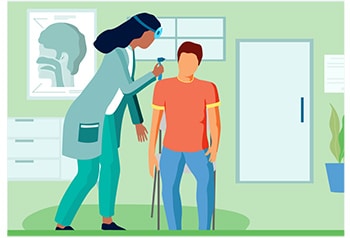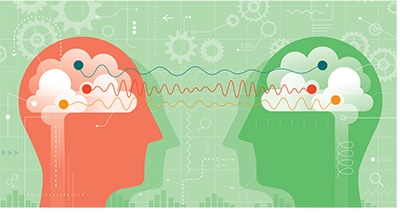Take Charge of Your Diabetes: Healthy Ears
Did you know that diabetes can harm your hearing and your balance? The good news is you can take steps to hear well and reduce your risk of falls. You’ve already taken an important step by finding this guide!
Tips To Keep Your Ears Healthy

Make an appointment with a health care provider called an audiologist (aw-dee-OL-uh-jist) to check your hearing and balance as soon as you are diagnosed with diabetes.
- Bring a list of your medicines and any illnesses and hospitalizations.
- Your audiologist will look at your history and test results to help you prevent or deal with ear problems.
- Your audiologist can tell you ways to protect your hearing and balance. For example, you can:
- Wear ear protection around loud noises like lawn mowers, leaf blowers, and chain saws.
- Not clean your ears with objects like cotton swabs, pencils, or paper clips.
- Create a healthy meal plan. You can work with a dietitian or diabetes care and education specialist to create a healthy eating plan.
- Ask your doctor or pharmacist if any of your medicines could harm your hearing. Share this information with your audiologist.
Regular exams help your audiologist find and treat ear problems early to protect your hearing and balance. Find a provider in your area at the American Academy of Audiology website.
Visit Your Audiologist Right Away if You
- Hear ringing or other noise in your ears or head.
- Have problems hearing or maintaining your balance.
- Become dizzy, fall, or feel worried you could fall.
- Have a sudden change in how clearly you can understand what people are saying.
- Have trouble understanding what people are saying because of background noise.
- Feel like people are mumbling when they talk to you.

How Can Diabetes Harm Your Ears?
- Diabetes damages small blood vessels in your inner ear and your vestibular (ve-STIB-yuh-ler) system, which is the part of your inner ear that helps with balance.
- Diabetes can make it harder for signals related to hearing and balance to get to your brain.
- Hearing loss is more common in people with diabetes.
- You are more likely to fall if you have diabetes because of damage to your vestibular system.
What Are the Signs of Balance Problems?
- Feeling dizzy or lightheaded.
- Feeling like your head is spinning.
- Falling or feeling like you may fall.
What You Should Know About Hearing Loss
- Hearing loss can make you appear confused or as if you are not paying attention.
- Uncorrected hearing loss can make you feel depressed or anxious.
- Family and friends may be aware of your hearing loss before you are.
- Hearing loss affects how you communicate at work, with family, and with your health care team.
Ask your health care team to help you set and reach goals to manage your blood sugar, blood pressure, and cholesterol and stop smoking—also known as the ABCs of diabetes.
- A1C (a measure of your average blood sugar over 3 months): The goal set for many people is less than 7% for this blood test, but your doctor might set a different goal for you.
- Blood pressure: High blood pressure causes heart disease. The goal is less than 140/90 mmHg for most people but check with your doctor to see what your goal should be.
- Cholesterol: LDL or “bad” cholesterol builds up and clogs your blood vessels. HDL or “good” cholesterol helps remove the “bad” cholesterol from your blood vessels. Ask your doctor what your cholesterol numbers should be.
- Smoking: If you smoke or use other tobacco products, take steps to quit. Call 1-800-QUIT-NOW (1-800-784-8669) for support.
Teach your family about your diabetes and the ABCs so they can help you.
Join the millions of Americans learning to manage their diabetes:
Ask your health care provider to refer you to diabetes self-management education and support (DSMES) services to help you manage your diabetes. Search for “Find a Diabetes Education Program in Your Area” to go to a website that lists programs recognized by the American Diabetes Association or accredited by the Association of Diabetes Care & Education Specialists.